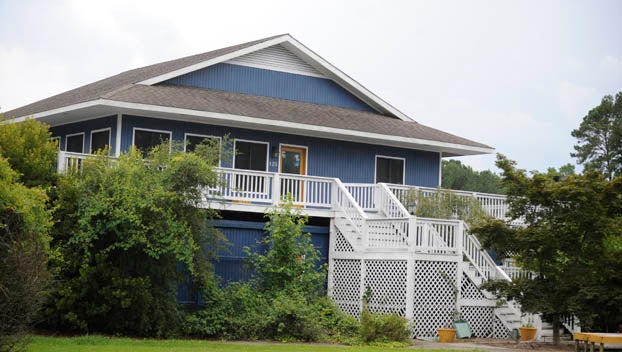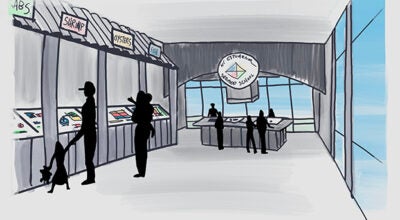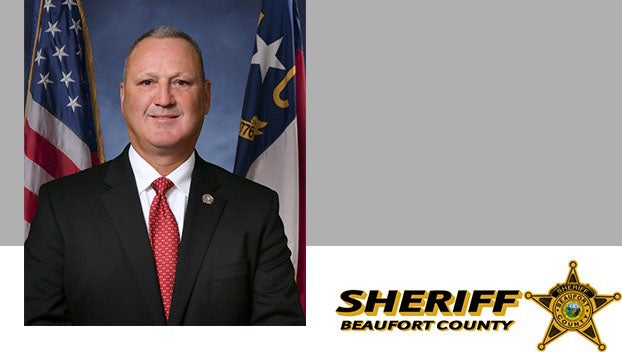Superior Court hearing scheduled for Powell Place dispute
Published 8:59 pm Thursday, October 28, 2021

- The former Racquet Club of Washington facility is located at 123 Avon Avenue in Washington. (Brandon Tester / Washington Daily news)
|
Getting your Trinity Audio player ready...
|
The ongoing legal proceedings between the City of Washington and the owners of the former Racquet Club of Washington property will continue with a hearing in Beaufort County Superior Court scheduled for Nov. 15.
The hearing is in regard to Bill and Dale Peele’s opposition to the city’s motions to dismiss the writ of certiorari that the property owners successfully petitioned for and were granted after City Council twice denied preliminary proposals to redevelop the property into a new subdivision called Powell Place. The city also motioned for Beaufort County Superior Court to strike the petition from the court record.
Certiorari is the process of having the court review a decision of an inferior court or government agency.
Two versions of the Powell Place subdivision preliminary plat — an initial version, and a new version to accommodate concerns and input from Council and city staff — were both rejected by City Council. Some nearby residents have remained staunchly against the project and have expressed their concerns during public comment periods at City Council and planning board meetings. Their concerns have to do with the proposed neighborhood’s density, compliance with ordinances, potential impact on local traffic and other topics.
“The decision to deny was not based on any City ordinances, as we have complied with all of them, which has been stated multiple times by City Planning Board representatives,” the Peeles wrote in a statement earlier this month. We gained their full approval twice. The decision, we believe, was not based on any procedural or administrative safeguards, but improperly influenced by the opinions of four neighbors who believe that our plan to build moderately sized housing will draw down their property value. We as property owners not only have a right to develop our property, but the City needs housing. We want to provide it.”
In previous statements as well as affidavits submitted to the court, the Peeles also have pointed to the involvement of Mayor Donald Sadler and his wife, Alice Mills Sadler. The Sadlers live in a neighborhood adjacent to the proposed property. One petition against the new subdivision that was presented to the planning board in February includes the signatures of Donald and Alice Sadler. On another version of that petition that was presented to City Council in April, Donald Sadler’s signature is whited out.
Neighbors of the property say allegations of the mayor having influence on their opposition to the subdivision are false.
“As current neighbors, we have an express interest in our neighborhood. We worked diligently to connect with the developer and other parties of interest to reach a good residential plan,” Marilyn Ore-Booth, one of the neighbors who petitioned against the project, said in a written statement.
Petitioner Jerry Boone said the major issue neighbors have with the proposed property is “getting a subdivision built that offers safety and is not overcrowded.”
When the second preliminary plat came before City Council, city staff acknowledged that the plat didn’t meet a couple of subdivision standards — including one that requires the length between two intersections to be no less than 300 feet, and another that requires lot lines to intersect streets at right angles. With that in mind, city staff said the proposed plat “meets the purpose and intent of the ordinance.”
“A subdivision absolutely can be built which fully complies with all ordinances,” petitioner Alice Phillips wrote.
“Attempting to squeeze 17 houses into this proposed subdivision is at the heart of all the problems with the plat,” Ore-Booth said. “ Fewer houses would solve all the noncompliance concerns. It could lessen safety concerns and result in a quality subdivision. I would welcome and would be eager to support such a subdivision.”
The Peeles slightly lowered the amount of proposed lots between the first and second preliminary plats, but they told City Council early in the process that reducing that number too much would eliminate the project’s economic feasibility.
“Through this entire experience with the city from January 14, 2021 to this date we have followed the City staff’s guidance, been approved three times by the Technical Review Committee, approved twice by the Planning Board, and still denied our property rights by some members of City Council who apparently allow their decisions to wrongfully and unlawfully be influenced by improper internal and external pressures,” the Peeles wrote in their statement.
The Peeles have filed a response in opposition to the city’s motions to dismiss the write of certiorari and strike the petition, and have filed a motion for a mandatory injunction requiring the city to issue a notice of determination
THE AFFIDAVITS
On Oct. 4, three affidavits related to these proceedings were filed in Superior Court; one by Bill Peele, one by Dale Peele and one by Marie Peedin, an engineer who has been working on the Powell Place property. The city has filed in Superior Court a motion to strike those affidavits. In that motion, the city said that “The alleged facts provided by said affidavits are irrelevant, immaterial and impertinent to this certiorari proceeding and beyond the limited scope of supplementation of the record contemplated by NCGS 160D-1402.”
The city added that the affidavits are “an untimely and impermissible ex mero motu attempt to amend and supplement the petition filed herein with information that was or should have been known to the petitioners at the time of filing the petition and that, if otherwise relevant, should have been included in the petition at the time of the filing.”
In their affidavits, which are made under oath on penalty of perjury, the three detailed their involvement in the Powell Place proceedings, from the earliest stages of the project to the present day.
“I have been a part of numerous subdivision and land development projects and have never experienced this type of injustice directed at a land owner and developer who is trying to do the right thing, and who is trying to increase the tax base and provide needed moderate income housing,” Peedin said in her affidavit.
“…. In summary, in my professional opinion, the Powell Place subdivision preliminary plat which has been presented to the City of Washington Council meets or exceeds all applicable laws, rules and regulations set forth by the State of North Carolina and the City of Washington zoning and subdivision ordinances, and there is no rational or lawful basis on which to deny approval of the preliminary plat.”
In Dale Peele’s affidavit, she alleges that Alice Sadler contacted her multiple times about the proposed subdivision around the same time the preliminary plats were first delivered to the city offices. Dale Peele claimed that during one phone call with Alice, which she said Donald Sadler also joined in by way of speakerphone, “… the Sadlers specifically told me that they opposed our plans to redevelop our property as a moderate income level residential subdivision.”
Dale Peele also mentioned meetings she had with city staff and city councilmembers prior to the preliminary plat presentation. She said the team working on the Powell Place project was “stunned” both times the preliminary plat proposals were rejected.
Bill Peele echoed many of Dale’s recollections in his affidavit.
“We want to develop our property in a way that allows us to recover some of our financial losses, but equally important, to enhance the aesthetics and and value of the neighborhoods along Atkins Drive and Avon Avenue,” Bill wrote. “Would the opposing neighbors prefer a high density (office and industrial zoning) development? Duplexes? Townhomes? Our lower density residential project would be so good for the City of Washington, and it would allow us to clean up the site since the failure of the lease purchase agreement with the last tenants of the WRC, leaving this property unused and vacant for several years now.”





